Aristide Calls for Haitian Talks in Miami : Politics: The exiled president invites all ‘democratic factions’ but excludes the military. The move seems intended to deflect criticism.
- Share via
WASHINGTON — Exiled Haitian President Jean-Bertrand Aristide, smarting from criticism that his insistence on regaining full powers has inhibited efforts to restore democracy to the nation, called Thursday for a conference of all “democratic factions” to search for ways to end military rule.
Aristide urged all parties represented in the Haitian Parliament, including some of his most outspoken political foes, to send representatives to a meeting next month in Miami. He proposed that they be joined by officials of the United Nations, the Organization of American States and international refugee organizations.
The military command, which has ruled the country since it ousted Aristide in a bloody coup in September, 1991, would be excluded.
The conference proposal seems intended to deflect criticism of Aristide for rejecting a U.S.-backed plan--suggested by Prime Minister Robert Malval--for a national reconciliation conference in Haiti to be attended by all parties, including Lt. Gen. Raoul Cedras, the army chief of staff. A State Department official said earlier this week that Aristide’s resistance to compromise is “frustrating” to the United States and other backers of Haitian democracy.
Aristide called the Miami meeting for Jan. 15, the deadline set Wednesday by representatives of the United States, France, Canada and Venezuela for the military to relinquish power or face tightened economic sanctions.
Military officers from the four countries, which are working together to resolve the crisis, set the deadline after Cedras and his subordinates refused to meet them when they traveled to Port-au-Prince to call on the Haitians.
Aristide’s Washington lawyer, former Rep. Michael Barnes (D-Md.), said there will be no need for the Miami conference if the military commanders yield power before that date. “But I don’t think they will,” he added.
He defended the decision to exclude the military from the Miami conference, saying, “There is only one reason for having a meeting with the army, and that is to set the date for their departure.”
After spending Wednesday at the French Embassy in Port-au-Prince waiting for the Haitian officers to show up, the four-nation delegation returned to Washington, warning that unless democracy is restored within the next three weeks, the United Nations will impose an across-the-board economic embargo in place of the current sanctions, which concentrate on weapons and petroleum.
Barnes said Aristide supports tougher sanctions even though they inevitably will increase the suffering of Haiti’s impoverished masses. He said the military is responsible for the sanctions.
Aristide did not attend Thursday’s Washington news conference, perhaps to avoid facing questions about criticism from American officials and Malval. Relations between Malval and Aristide have become increasingly tense. The prime minister has said that Aristide’s ego is one obstacle to resolving the crisis.
More to Read
Sign up for Essential California
The most important California stories and recommendations in your inbox every morning.
You may occasionally receive promotional content from the Los Angeles Times.













